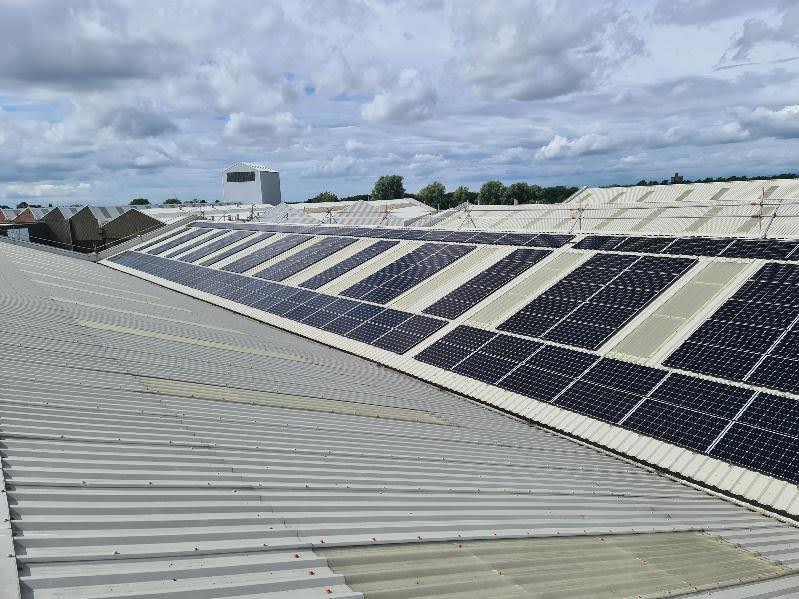In recent years, the drive towards sustainability has propelled various industries to seek environmentally friendly alternatives to conventional energy sources.
The automotive sector, known for its significant energy consumption, is no exception, with car dealerships increasingly turning to solar power as a viable solution.
This adoption of solar panels is not just a nod to environmental stewardship but also represents a savvy financial investment.
As we delve into the transformation underway in car dealerships through solar energy, we uncover not only a commitment to reducing carbon emissions but also a strategic move towards economic efficiency and energy independence.
The integration of solar panels into car dealership operations illuminates a path towards a greener, more sustainable future in automotive retail.
These installations, characterized by their gleaming arrays of photovoltaic cells, serve multiple purposes—from slashing operational costs to enhancing the dealership’s brand image among eco-conscious consumers.
Beyond the immediate financial and environmental benefits, solar power positions dealerships for long-term stability and growth in an increasingly eco-aware market.
The transition to solar energy is thus a multifaceted strategy, combinimapsng ethical responsibility with pragmatic business benefits, heralding a new era of sustainability in the automotive sector.
Cost Savings
The attraction of solar power for car dealerships predominantly lies in the significant cost savings it facilitates.
By utilising the sun’s energy, dealerships can drastically reduce their reliance on the traditional power grid, leading to substantial reductions in energy bills.
This financial benefit is especially attractive as it compounds over time, with the initial investment in solar technology being recouped through ongoing operational savings.
The ability to generate electricity on-site not only decreases monthly expenses but also shields the business from future energy price increases, ensuring a predictable and manageable cost structure.
Moreover, solar installations can contribute to operational efficiencies beyond simple cost reduction.
For example, excess power generated can sometimes be sold back to the grid, turning an energy solution into a potential revenue stream.
This aspect of solar energy use, known as net metering, further enhances the economic appeal of solar power for car dealerships, providing an additional financial cushion that can be reinvested into the business or used to offset the costs of the solar system more quickly.
Green Image and Marketing Advantage
In today’s market, a commitment to sustainability can significantly enhance a dealership’s brand image. Eco-conscious consumers value businesses that demonstrate a dedication to reducing environmental impact.
By integrating solar panels into their operations, car dealerships broadcast a strong message of responsibility and forward-thinking to the public.
This not only differentiates the dealership in a competitive market but also attracts a demographic of consumers who might prioritize environmental considerations in their purchasing decisions.
Furthermore, leveraging solar power as part of a dealership’s marketing strategy can amplify its appeal.
Social media campaigns, promotional materials, and onsite signage that highlight the use of renewable energy can capture the attention of potential customers.
This green branding not only fosters a positive public perception but also aligns the dealership with broader societal shifts towards sustainability, potentially leading to increased customer loyalty and brand advocacy among environmentally minded individuals.
Long-Term Stability
The shift towards solar energy offers dealerships a stable and predictable energy source.
Unlike fossil fuels, whose prices can fluctuate wildly due to market dynamics, solar power provides a consistent and reliable supply of electricity at a fixed cost.
This predictability is invaluable for financial planning and budgeting, allowing dealerships to forecast their operational expenses with greater accuracy.
Furthermore, the longevity of solar panel systems, which can last for decades with minimal maintenance, ensures a long-term reduction in energy costs.
This stability extends beyond just financial forecasting. As concerns about climate change prompt governments to impose stricter regulations on carbon emissions, dealerships utilising solar power are already ahead of the curve, mitigating the risk of future compliance costs.
Additionally, the ability to generate electricity on-site reduces dependency on external power sources, which can be critical during power outages or in areas with unreliable grid infrastructure.
Thus, solar power not only secures financial stability but also operational continuity in the face of external challenges.
Tax Incentives and Rebates
Governments worldwide are offering various incentives to encourage the adoption of renewable energy technologies, including solar panels.
These incentives can significantly lower the upfront cost of solar installations for car dealerships, making the investment even more attractive.
Tax credits, rebates, and grants can reduce the initial financial burden, accelerating the payback period and increasing the overall return on investment.
Furthermore, these financial incentives reflect the public sector’s support for sustainable practices, aligning car dealerships with governmental environmental goals.
In addition to national or regional programs, local governments often provide additional incentives for businesses that adopt green technologies.
These can include reduced property taxes, expedited permitting processes for solar installations, or even direct financial assistance.
By taking advantage of these incentives, car dealerships not only improve their bottom line but also contribute to the wider adoption of clean energy, positioning themselves as leaders in the transition towards a more sustainable economy.
Increased Property Value
Installing solar panels can significantly enhance the value of a dealership’s property. Properties equipped with solar power systems are often valued higher due to their reduced operating costs and sustainability features.
This increase in property value can be a boon for dealerships, whether they are considering selling their property or leveraging it for financing purposes.
The perception of solar panels as a modern and desirable amenity can also make the property more attractive to potential buyers or tenants, should the dealership decide to relocate or lease part of its premises.
The improvement in property value is a testament to the growing recognition of solar power’s benefits, not just in terms of energy savings but also as an investment in sustainability.
As more businesses and consumers prioritise eco-friendly features, the demand for properties that incorporate green technologies is likely to increase.
For car dealerships, this trend offers an opportunity to not only reduce their environmental footprint but also to capitalise on the market’s shifting preferences towards sustainability.
Energy Independence
The ability to generate power on-site grants car dealerships a level of energy independence, reducing their reliance on external suppliers and protecting them against fluctuations in energy availability and cost.
This autonomy is particularly valuable in regions where energy supply can be inconsistent or in situations where natural disasters or infrastructure failures might otherwise disrupt business operations.
Solar power ensures that dealerships can maintain their activities even in the face of such challenges, providing a reliable backup that can keep critical systems running.
Energy independence also aligns with broader goals of reducing national dependency on imported fuels, contributing to energy security and sustainability.
By adopting solar power, car dealerships play a part in this larger narrative, showcasing how businesses can lead by example in the transition to a more resilient and sustainable energy landscape.
Conclusion
The integration of solar panels into car dealership operations offers a host of benefits, from substantial cost savings and enhanced brand image to long-term stability and increased property value.
As the automotive industry continues to move towards sustainability, solar energy stands out as a practical, financially viable solution for dealerships aiming to reduce their environmental impact and secure a prosperous future.
By embracing the sun’s power, car dealerships are steering towards a greener, more sustainable tomorrow, demonstrating that economic success and environmental stewardship can go hand in hand.





